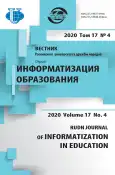The use of interactive mnemonics for the development of communication skills of preschoolers
- 作者: Builina E.E.1, Rudakova D.T.1
-
隶属关系:
- Moscow City University
- 期: 卷 17, 编号 4 (2020)
- 页面: 306-314
- 栏目: INNOVATION PEDAGOGICAL TECHNOLOGIES IN EDUCATION
- URL: https://journal-vniispk.ru/2312-8631/article/view/321256
- DOI: https://doi.org/10.22363/2312-8631-2020-17-4-306-314
- ID: 321256
如何引用文章
全文:
详细
Problem and purpose. The experience of using mnemonics as a set of methods and techniques in preschool institutions is considered. The purpose of the described research is to ensure the most effective mastering by preschoolers of ideas about the world around them and the development of speech. Methodology. In the course of the research, the analysis of normative documents, psychological and pedagogical experience in the use of mnemonics was carried out, a generalization and systematization of the material on this topic was made, the reflection of the content of the formed knowledge has been done. Results. A proven method of using mnemonics in a preschool institution for the development of speech and understanding the features of the surrounding world is proposed. Step-by-step recommendations are formulated for the implementation of this technology in the organization of the activities of preschoolers. The psychological features of the use of mnemonic techniques, which contribute to the development of not only communication skills, but also the creative activity of children, are revealed. Conclusion. It is shown that the technique of using mnemonics has great potential and should be recommended for dissemination in work with a variety of groups of children with developmental features. At the same time, it was revealed that today in preschool institutions, mnemonics is used mainly in the traditional format, while the integration of the methodology with interactive information technologies is effective. The results of the study allow to draw conclusions about the prospects of the direction of interactive technology of mnemonics, which is faced with a problem of the level of readiness of employees of children's institutions to use them. In general, the research materials confirm that the integration of mnemonic techniques into the play activity of preschoolers corresponds to the age characteristics of children, contributes to the development of creativity, mutual understanding, deepening of interest and curiosity in the world around them.
作者简介
Elena Builina
Moscow City University
编辑信件的主要联系方式.
Email: bujlelena@yandex.ru
master’s student of the Department of Informatization of Education
29 Sheremetyevskaya St, Moscow, 127521, Russian FederationDora Rudakova
Moscow City University
Email: dtrudakova@gmail.com
candidate of pedagogical sciences, associate professor of the Department of Informatization of Education
29 Sheremetyevskaya St, Moscow, 127521, Russian Federation参考
- Tkachenko TA. Ispol'zovanie skhem v sostavlenii opisatel'nyh rasskazov [The use of schemes in the compilation of descriptive stories]. Doshkol'noe vospitanie [Preschool education]. 1990;(10):16–21.
- Omelchenko LV. Ispol'zovanie priemov mnemotekhniki v razvitii svyaznoj rechi [Use of mnemonics techniques in the development of coherent speech]. Logoped [Logopedist]. 2008;(4):102–115.
- Bolshova TV. Uchimsya po skazke. Razvitie myshleniya doshkol'nikov s pomoshch'yu mnemotekhniki [Learning from a fairy tale. Development of preschool children's thinking using mnemonics]. Saint Petersburg: Detstvo-press; 2015.
- Bujlina EE. Problemy formirovaniya kommunikativnyh navykov u detej doshkol'nogo vozrasta [The problem of formation of communicative skills in preschool children]. Nauka v megapolise [Science in the city]. 2020;3(19):13–16.
- Vasileva OS. Ispol'zovanie tekhnologii mnemotekhnika v obrazovatel'nom processe DOU [Use of mnemonics technology in the educational process of DOW]. Vestnik nauki i obrazovaniya [Bulletin of science and education]. 2015;(3):56–59.
- Usenko YuV. Ispol'zovanie mnemotablic v poznavatel'no-rechevom razvitii doshkol'nika [The use of mnemotables in the cognitive and speech development of preschool children]. Doshkol'naya pedagogika [Preschool pedagogy]. 2013;(7):18–23.
- Rudakova DT. Informacionnye tekhnologii dlya organizacii poznavatel'noj deyatel'nosti i razvitiya lichnosti [Information technologies for the organization of cognitive activity and personal development]. Social'no-kul'turnye processy v usloviyah integracii i dezintegracii [Socio-cultural processes in the context of integration and disintegration]: proceedings of the All-Russian scientific conference with international participation. Ulan-Ude: BGU imeni D.Sh. Cyrendorzhieva Publ.; 2017. p. 122–124.
- Apatov NV. Informacionnye tekhnologii v shkol'nom obrazovanii [Information technologies in school education]. Moscow: Prosveshchenie Publ.; 2014.
- Rudakova DT. The maintenance and principles of Internet-education. Bulletin of Peoples’ Friendship University of Russia. Series: Informatization of Education. 2009;(3):34–39.
- Zuby AV. Informacionnye tekhnologii v lingvistike, ispol'zovanie sovremennyh informacionno-kommunikacionnyh tekhnologij v uchebnom processe [Information technologies in linguistics, the use of modern information and communication technologies in the educational process]. Barnaul: BGPU Publ.; 2016.
- Chepurnoj GA. Mnemotekhnika: tekhnologiya effektivnogo usvoeniya informacii v usloviyah sovremennogo obrazovaniya [Mnemonics: technology of effective assimilation of information in the conditions of modern education]. Ternopol: Mandrivec Publ.; 2013.
- Rudakova DT. Razvitie kommunikativnoj kul'tury na osnove ispol'zovaniya informacionno-kommunikativnyh tekhnologij [Development of communicative culture based on the use of information and communication technologies]. Obrazovatel'nye tekhnologii XXI veka. OT’06 [Educational technologies of the XXI century. OT’06]: proceedings of the Sixth city scientific and practical conference. Moscow; 2006. p. 111–118.
- Polat ES. Sovremennye pedagogicheskie i informacionnye tekhnologii v sisteme obrazovaniya [Modern pedagogical and information technologies in the education system]. Moscow: Akademiya Publ.; 2018.
- Efimenkova LN. Formirovanie rechi u doshkol'nikov [Formation of speech in preschool children]. Moscow: Prosveshchenie Publ.; 2018.
- Maslennikova DK, Samylova OA. Ispol'zovanie mnemotekhnicheskih priemov dlya formirovaniya svyaznoj rechi u detej starshego doshkol'nogo vozrasta s ONR III urovnya [Use of mnemonic techniques for forming coherent speech in children of senior preschool age with ONR of level III]. Psihologicheskie nauki [Psychological science]. 2018;(8):140–145.
补充文件









